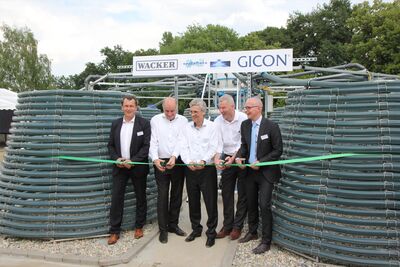GICON celebrates commissioning of GICON® photobioreactor Octagon

On Wednesday (19.06.2019), GICON, the Dresden-based engineering service provider successfully commissioned the world's first GICON® Octagon photobioreactor at its Cottbus location.
With the cutting of the green band, the world's first GICON® photobioreactor Octagon was put into operation. It is the world's first photobioreactor for the production of microalgae that can be used outside in the open without restrictions. GICON® founder Prof. Jochen Grossmann spoke to around 90 guests from politics, business and research about "a giant step" for the company. The Mayor of Cottbus, Holger Kelch, said in his greeting that he was proud that "here (Cottbus; editor's note) a company has created a world’s first and is taking climate change into consideration". Maarten Flikkema, Senior Project Manager at the Maritime Research Institute in Netherlands and Project Coordinator for the EU funded project Space@Sea, underlinded the achievement of GICON as “an example of how EU funding should be used leading towards a demonstrator. It is a product to touch. In his speech, Dr. Christoph Kowitz, Head of Research and Development at Wacker Chemie AG, emphasized the excellent cooperation between his company and GICON®: "The concentrated efforts have led to this milestone in German algae research". Together with GICON, Wacker developed the innovative double-chamber tube for use in the GICON® Photobioreactor. This enables, among other things, the targeted temperature control of the algae biomass and thus ideal growth conditions which are always possible under the most varied climatic conditions. Dr. Jochen Michels, DECHEMA research project coordinator, emphasized the immense importance of algae research as a response to climate change and that "the flexible and modular octagon concept is a determined step towards positioning microalgae in a future bioeconomy".
Cottbus location deliberately chosen
GICON® deliberately chose the location for its world’s first in its Cottbus branch. "Here, we have optimal working conditions and can benefit from synergy effects with our other innovation lines and cooperation partners," emphasized Prof. Grossmann. The engineering service provider has been operating an organic waste research center in the Brandenburg city for many years. At present, research is being carried out, among other things, into an optimal organic waste disposal system for the metropolis of Paris in the future. The topic of algae is now expanding the spectrum of the organic waste research center. A research project on coupling the biogas process with algae production is already underway.
GICON® photobioreactors show their rich green color
The inoculation of the photobioreactor system was performed as planned using a start-up culture of microalgae. The cells were distributed evenly in all eight reactors due to the symmetric arrangement. On the day of the ceremonial commissioning, the reactors were already visible in full green color. The guests were visibly impressed by this convincing result in the bright sunshine and high outside temperatures. The effective cooling of the integrated double chamber system stood out and the functional maturity could thus be demonstrated. The solar collectors in a truncated cone-shaped construction imitate the natural growth form of Christmas trees (biomimetic design). The height and angle of inclination of the collectors are adapted to the respective location. Thus, sunlight can be effectively absorbed throughout the day and is uniformly available for microalgae culture.
Dr. Stefan Matthes, Project Engineer at GICON, emphasized in his presentation that these properties allow the reactor to be used all year round and worldwide for microalgae production. The harvested algae can be used as food supplements, feed additives and as raw materials for many other biotechnological products. Within the framework of the EU project "Space@Sea", the focus is on the use of the technology on work platforms floating on the sea.
Algae from the sea?
Space@Sea is funded by the EU's Horizon 2020 research and innovation program (Grant Agreement No. 774253). The developmental vision is to create additional useful areas on the sea in the form of floating islands and to set up places of work with living space. The GICON® Octagon photobioreactor will play a major role in supplying people on the artificial islands, but also as part of an innovative "aquatic agriculture". In the coming months, GICON® will further develop the functionality of its octagon at the Cottbus location and test the modular functionality, a decisive criterion for use on an industrial scale at sea.